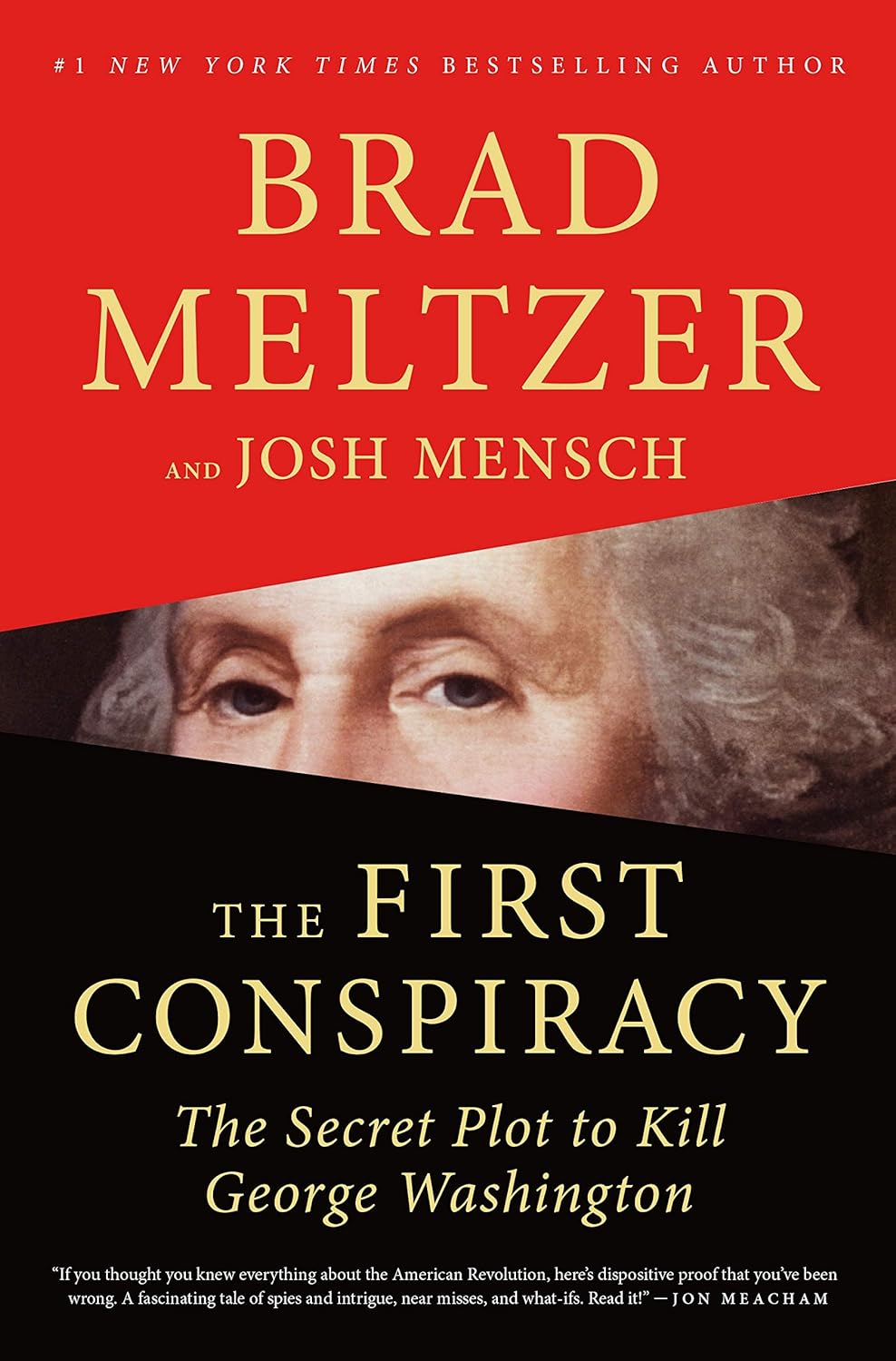The First Conspiracy
ISBN: 978-1250130334

They referred to it as “Sacricide”. This term perhaps reflects the entirety of the story contained in this book. The planned kidnapping/murder of George Washington was thought of in the same manner as killing something sacred. It is clear that to the Revolutionary soldiers that were to fight the battles that would ultimately win independence from Britain, something about George Washington went beyond the standard definition of a man.
Brad Meltzer and Josh Mensch do a fair job of telling the tale. The transitions often times feel somewhat forced between chapters but this is because the writing style has adopted the curious technique of indicating the events to the reader as happening in their present time. The reader is “brought into” the story as though they are experiencing it ‘right now’. This then, therefore, demands some chapter transitions that have a bit of an old-time radio feel to them in that they feel like cliffhangers and their resolutions. Perhaps this switch to a more active voice was intentional to make the history seem “more alive”. Of course, after the present period of ‘conspiracy theory’ explosions and false information and fake news, the effect might be unnecessary. During Washington’s time as per the governor of the New York colonies working for Britain–Tryon–might have said “One need pay no heed to all these false conspiracies.” Of course, Tryon was plotting and planning vigorously. Indeed, whether Tryon or the Mayor of New York is more responsible for the plot is hard to know. The Mayor, David Mathews, later, in Canada, admits that he helped formed the plot after, of course, protesting his innocence to save his own skin. The truth is, both men stood to lose much if the colonies became independent and so naturally, they would have been willing to avail themselves of all schemes to try hang on to their positions and privileges.
We therefore are not thrust into conspiracy theory with this book but conspiracy fact. One is struck, if they are familiar with history, with the similarities between the story concerning Washington and this proposed plot, and the later version of events that occur with Lincoln. The idea of “kidnapping” Lincoln was also put forth, but in fact an execution was the outcome. This too was part of an elaborate conspiracy within the government and the army. Indeed, we find that within Washington’s ranks, there are people who are within the most intimate circles of trust that are bought-off by Britain. Washington subsequently must become a very competent spy-master and as history records did so exceedingly well. It is ironic, perhaps, that he does this not so much against the enemy directly, but against the traitors in his own causes that have no loyalties to anything other than their wallets.
The scholarship is not lacking in this telling of the tale, and it does put to rest some “legends” concerning Washington or attempts to. There is the story that during the war Washington’s own housekeeper was a spy, and so through various nefarious means someone attempted to poison his peas. A young girl in the household notices this and throws the peas out the window where the chickens eat the peas and die. Meltzer and Mensch tell us that these tales are fiction or at least their research does not support the event. Of course, we know that there are other tellings of Presidents being poisoned such as Zachary Taylor’s bowl of cherries and iced milk that may or may not have been poisoned leading to his eventual death.
We also learn how a ring of would-be counterfeiters plays into both the plot to kill Washington and also its resolution. Regular people, it seems, are being sucked into all manner of happenings due to their circumstance and their way of trying to cope with it. Once caught, almost no one tells the truth, and those that do are not believed simply because no one else is forthcoming.
Another interesting piece in the book concerns the condition of the army that Washington must train. When Washington arrives, the army is literally in rags. Perhaps this contributes to the almost “divine status” attributed to Washington since he takes this army and gradually forms it into something capable of prevailing over the British.
By way of illustration, we learn how Washington handles the incoming invasion of New York. The authors note that though it does not make for a great story, Washington loses and escapes into the night with his army. Before this though, Washington and his men manage to smuggle some cannons into position in Boston at the battle of Bunker Hill and Breed’s Hill. The way in which this happens is nothing short of incredible, as the effort required is immense– stretching the bounds of credulity. This living to fight another day and unexpected victories, the British learn and the book notes, become hallmarks of Washington’s military strategy and ultimate success. If there is anything Washington is good at even though he is inexperienced as a commander, it is, we are told, knowing when he is beaten and when it is time to leave the battlefield.
If you are a casual reader of history, this book will interest you. If you are accustomed to reading history, some of the tone in the book may be off-putting since it has a flare of sensationalism in timbre. Since the target audience is most likely casual readers of history, the choice makes sense from the perspective of the authors in order to martial more sales by widening the potential audience. It does not hurt the scholarship which often does suffer from trying to engage informal readers.